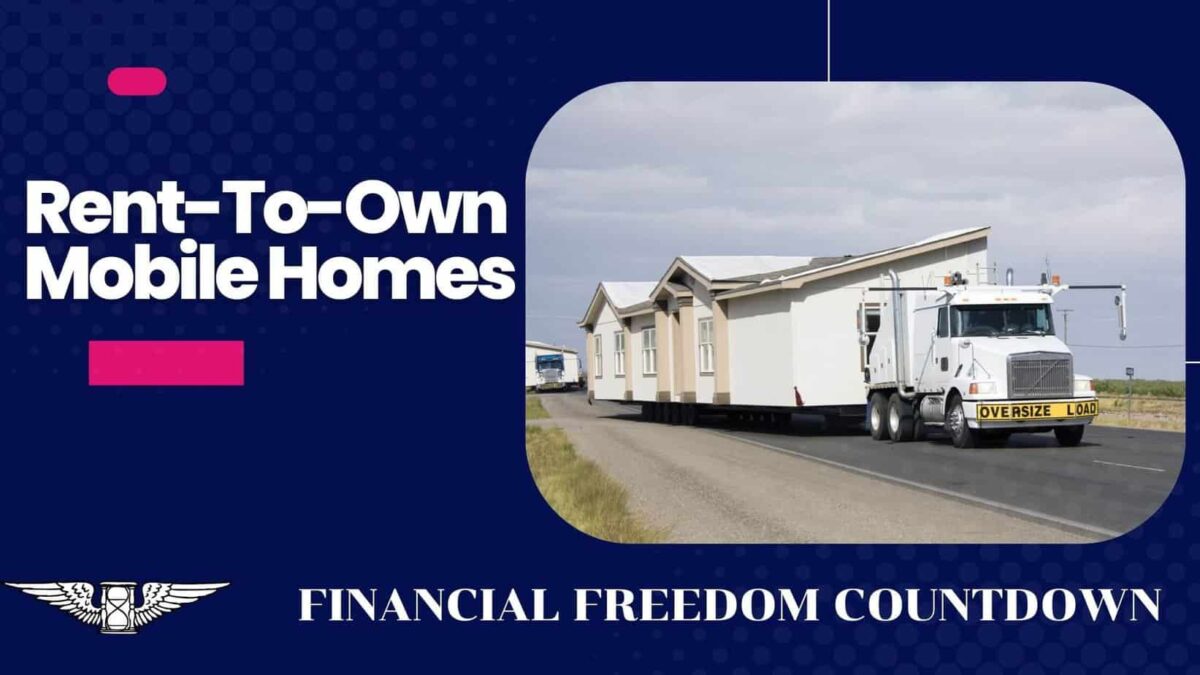Rent to Own Mobile Homes: An Affordable Path to Homeownership

After years of renting apartments and moving from one neighborhood to another, Sarah and John finally grew tired of not having a place to call their own. But with their savings not quite ready for a traditional home mortgage, they began to lose hope of becoming homeowners anytime soon. One day, while scrolling through housing options, Sarah stumbled upon a solution that seemed almost too good to be true: a rent-to-own mobile home. “Could this be the key to homeownership we’ve been searching for?” she thought. With excitement, they dived into research, discovering that rent-to-own mobile homes offered a flexible, affordable path that fits their financial situation perfectly.
For families like Sarah and John, rent to own mobile homes offer a practical alternative to traditional home buying. With housing prices rising, many potential homeowners face barriers such as poor credit, lack of savings for a down payment, or an inability to secure a mortgage. Rent-to-own agreements provide an accessible way for people to step into homeownership while also allowing them to build equity over time. This article will explore how rent to own mobile homes work, the benefits and risks involved, and why this option is becoming increasingly popular in today’s housing market.
What Are Rent-to-Own Mobile Homes?
A rent-to-own mobile home agreement combines elements of renting and homeownership, giving tenants the option to buy the home after a set period. Here’s how it generally works:
- Initial Agreement: A tenant signs a lease with an option to purchase the mobile home after a certain time, typically 1 to 5 years.
- Rent Payments: The tenant pays monthly rent, a portion of which is often credited toward the future purchase of the home.
- Option Fee: In most rent to own mobile homes agreements, the tenant pays an upfront option fee, which gives them the right—but not the obligation—to purchase the home at the end of the lease. This fee is typically 2-7% of the home’s purchase price.
- Purchase Price: The purchase price is often agreed upon at the start of the lease, allowing the tenant to lock in a price despite potential market changes.
This arrangement allows tenants to live in the home while building toward ownership. At the end of the lease term, the tenant can purchase the mobile home or walk away, forfeiting any payments credited toward the purchase and the option fee.
The Growing Popularity of Rent-to-Own Mobile Homes
With home prices rising steadily, more people are turning to rent-to-own mobile homes as a solution to affordable housing. According to the U.S. Census Bureau, the median price of new homes sold in the United States increased by 17.4% between 2020 and 2022. As a result, traditional homeownership has become out of reach for many, especially first-time buyers and low- to moderate-income households. (Source: U.S. Census Bureau, New Residential Sales Report, 2022)
On the other hand, mobile homes remain one of the most affordable housing options available. In 2021, the average sales price for a new manufactured home was $87,600, compared to $408,100 for a single-family home. (Source: U.S. Census Bureau, Manufactured Housing Survey, 2021) This price gap has driven interest in mobile homes, particularly in rent-to-own agreements that provide a more accessible path to eventual homeownership.
Another factor contributing to the rise in rent-to-own mobile homes is the increase in alternative financing options. According to Freddie Mac, around 34% of U.S. households rent, with many citing financial challenges as the main barrier to buying a home. (Source: Freddie Mac, 2021 U.S. Housing Market Research) For those with lower credit scores or insufficient down payments, rent-to-own offers a potential solution without the immediate financial burden of securing a mortgage.
How Rent-to-Own Mobile Homes Work
rent to own mobile homes agreements are structured to give tenants time to save for a down payment, improve their credit, and ultimately buy the home. Here’s a breakdown of how the process typically works:
3.1. Initial Agreement and Option Fee
When entering a rent-to-own agreement for a mobile home, tenants usually pay an upfront option fee. This one-time, non-refundable fee allows the tenant to purchase the house at the end of the lease. The option fee typically ranges from 2-7% of the home’s purchase price. For example, if a mobile home is valued at $70,000, the tenant may pay an option fee of around $2,100 to $4,900.
This fee serves as a form of commitment from the tenant, ensuring they have a serious interest in eventually purchasing the home.
3.2. Monthly Payments and Credits
During the lease period, tenants pay a monthly rent. In some rent-to-own agreements, a portion of this rent is credited toward the future purchase price of the home. For instance, if a tenant pays $1,000 monthly rent, $200 could go toward the mobile home’s eventual down payment or purchase price.
This system allows tenants to gradually build equity while still enjoying the flexibility of renting. However, if the tenant decides not to purchase the home at the end of the lease term, they forfeit any credits toward the purchase.
3.3. Final Purchase
At the end of the lease period, the tenant can buy the mobile home at the agreed-upon price. The option fee and rent credits are typically applied to the down payment if they decide to purchase. If the tenant chooses not to buy, they lose their option fee and any rent credits, but they can walk away from the deal without further financial obligation.
The Pros of Rent-to-Own Mobile Homes
Rent-to-own mobile homes offer several advantages, especially for those who can help with traditional home financing.
4.1. Accessible Path to Homeownership
Rent-to-own agreements provide a more accessible homeownership route for individuals with poor credit or insufficient savings for a down payment. Since the purchase decision happens later, tenants have time to repair their credit and build up savings, giving them a better chance of securing a mortgage when the lease ends.
4.2. Fixed Purchase Price
In most rent-to-own agreements, the purchase price of the mobile home is locked in at the start of the lease. This can be a significant advantage in rising housing markets, where property values may increase. According to data from Zillow, U.S. home values increased by an average of 16.5% from 2020 to 2022, with some areas experiencing even greater appreciation. (Source: Zillow Home Value Index, 2022)
This means that when the lease ends, tenants could buy the home at a lower price than the market value, giving them potential built-in equity.
4.3. Time to Test the Property
Another benefit is that rent-to-own allows tenants to live in the home and the community before fully committing. If they don’t like the area or the mobile home doesn’t suit their needs, they can walk away without the burden of a long-term mortgage.
The Risks of Rent-to-Own Mobile Homes
While rent-to-own mobile homes offer numerous benefits, potential buyers should be aware of the risks involved in these agreements.
5.1. Non-Refundable Option Fee
The option fee is usually non-refundable, meaning that if the tenant decides not to purchase the mobile home at the end of the lease term, they will lose the fee. This can be a significant financial loss if the tenant chooses to leave the deal.
5.2. Limited Legal Protections
Rent-to-own contracts vary significantly in terms of the protections they offer to tenants. Sometimes, the landlord or seller may still evict the tenant for missing payments or violating the lease, even if the tenant has paid an option fee. It’s essential to read the contract carefully and consult a legal expert to ensure the agreement is fair.
5.3. Responsibility for Maintenance
In many rent-to-own agreements, the tenant is responsible for maintenance and repairs, even though they don’t yet own the property. This can result in unexpected costs, making it difficult for tenants to save for the final purchase.
Is Rent-to-Own Right for You?
Rent-to-own mobile homes can be attractive for those facing financial barriers to traditional homeownership. They provide:
- Flexibility.
- Time to improve finances.
- The opportunity to build equity before taking on the full responsibility of homeownership.
However, it’s crucial to carefully review the agreement’s terms and be aware of the risks involved.
As the housing market continues to evolve, alternative pathways to homeownership, like rent-to-own mobile homes, are likely to grow in popularity. In a world where home prices continue to rise, this option can be a valuable stepping stone for those who are not yet ready—or able—to buy a home through conventional means.
Conclusion
For Sarah and John, the rent-to-own option was a game changer. It allowed them to move toward homeownership in a manageable and attainable way. If you’re struggling to save for a down payment or have credit challenges, rent-to-own mobile homes may offer the necessary flexibility. By understanding the terms and making informed decisions, you can potentially turn the dream of homeownership into reality—one rent payment at a time.




